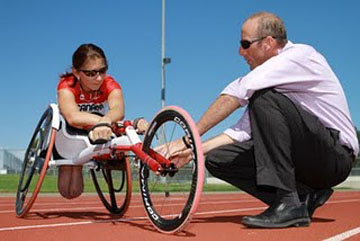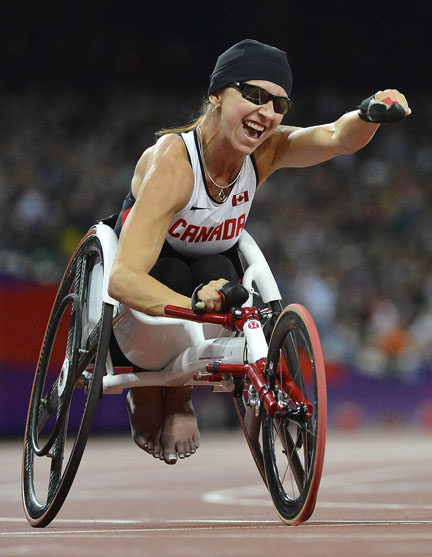
Before Paralympian Michelle Stilwell takes to the track Wednesday night in search of a second gold medal at the London Paralympic Games, one of the last faces she will see belongs to her coach Peter Lawless.
Lawless, a Victoria-based lawyer, splits his time between a thriving sports law practice and training elite athletes. He was instrumental in Stilwell’s switch from wheelchair basketball, in which she was the first quadriplegic to win Paralympic gold in Sydney in 2000, to wheelchair racing in 2004.
Stilwell won the T52 class 100-metre and 200 m at the 2008 Beijing Paralympics, and has already defended her 200 m title in London. She also holds the world record for both events.
Speaking to Legal Feeds from London, Lawless says his job now is to get Stilwell in shape mentally for the 100 m. The pair have been training in the evening to simulate conditions for tomorrow’s race, which goes off after 9 p.m. local time.
“It’s not really about the physical side any more, because if you don’t have the physical side, you wouldn’t even be here,” Lawless says. “It’s about whose headspace is best, who’s best prepared.”
Lawless says he will be the picture of calm in the last moments before the race.

“They need that. They’re going to feed off you, and they don’t need to feel fear, anxiety, or any lack of confidence from you,” he says.
In addition to his lawyerly and coaching roles, Lawless has added a couple more strings to his bow in London, doubling as media relations officer for his Paralympic athletes, Stilwell and road cyclist Mark Ledo, as well as spare parts broker. Earlier, this week, a couple of flat tires spurred calls to specialist manufacturers in Germany, before a dealer in Coventry, 150 km north of London, came through for him.
“If your athlete needs something, you’ve got to provide it,” says Lawless.
Lawless, who was a competitive sailor before making the transition to coaching, has allowed his passion for sport to show in his legal career. Since his call to the bar in 2001, he has carved out a niche in sports law, representing sports organizations, athletes, and coaches in a variety of disputes over issues including doping and team selection. He has appeared before the International Court of Arbitration for Sports, and also sits on the board of directors of the Canadian Olympic Committee.
“It’s been very difficult for someone on the west coast, in Victoria especially, because the sports organizations are very central-Canada focused,” says Lawless.
This Paralympics is his third, and Lawless says it’s also been the best so far.
“It’s much better than previous games. Often the Paralympics are something of an afterthought, but the British population has really embraced it,” he says.

 Before Paralympian Michelle Stilwell takes to the track Wednesday night in search of a second gold medal at the London Paralympic Games, one of the last faces she will see belongs to her coach Peter Lawless.
Before Paralympian Michelle Stilwell takes to the track Wednesday night in search of a second gold medal at the London Paralympic Games, one of the last faces she will see belongs to her coach Peter Lawless. “They need that. They’re going to feed off you, and they don’t need to feel fear, anxiety, or any lack of confidence from you,” he says.
“They need that. They’re going to feed off you, and they don’t need to feel fear, anxiety, or any lack of confidence from you,” he says.